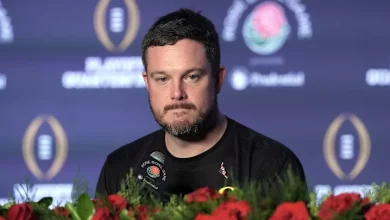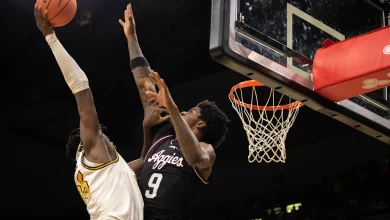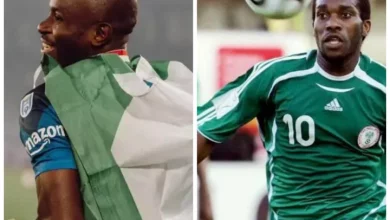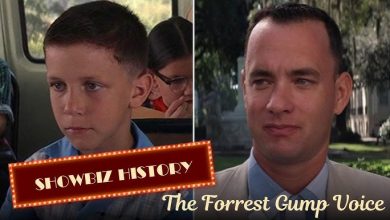The Chicago Bears are infatuated with Marcus Freeman, saying, “He’s the closest thing I’ve seen to Sean McVay.”
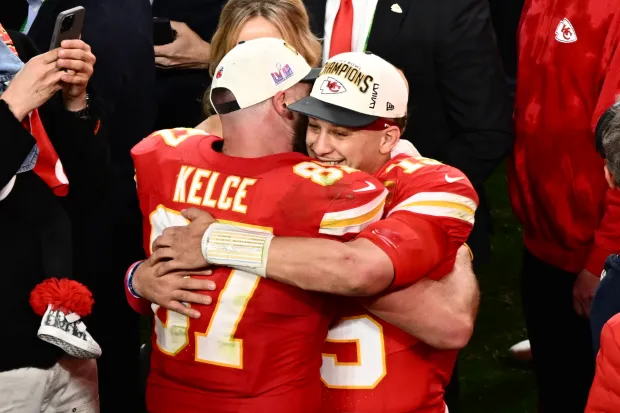
In the ever-changing landscape of the NFL, where innovative coaching can be the difference between mediocrity and greatness, the Chicago Bears have found themselves looking outside the NFL for the next big thing—a head coach who can bring a new energy and dynamic approach to a franchise that has struggled for consistent success. That “next big thing,” according to many within the Bears organization, may be Marcus Freeman, the current head coach of the Notre Dame Fighting Irish.
Freeman, a young, charismatic, and highly intelligent coach, has quickly built a reputation as one of the brightest minds in college football. His ability to develop players, create innovative schemes, and foster a winning culture has drawn comparisons to NFL coaching luminaries like Sean McVay, the head coach of the Los Angeles Rams, who has redefined modern football coaching with his innovative offensive strategies and youthful energy.
In fact, some within the Bears’ front office and coaching staff have gone so far as to say that Freeman is “the closest thing I’ve seen to Sean McVay,” a statement that highlights both the high expectations placed on Freeman and the potential the Bears see in his leadership abilities. In this article, we’ll explore why the Bears are so enamored with Freeman, examine the comparison to McVay, and discuss what this means for the Bears’ future, both in terms of their current team-building process and their long-term organizational direction.
Marcus Freeman’s Rise: A New Era in College Football
Marcus Freeman’s rapid rise to prominence as a head coach is a remarkable story. After playing linebacker at Ohio State, Freeman transitioned into coaching, starting as a graduate assistant and gradually climbing the coaching ranks. His tenure as a defensive coordinator at Cincinnati and then at Notre Dame earned him widespread recognition for his ability to turn defenses into dominant units. Freeman’s emphasis on discipline, high-level execution, and his understanding of the modern college football landscape made him an attractive candidate for top programs, and it wasn’t long before he was tapped to lead Notre Dame.
When Brian Kelly left Notre Dame for LSU in 2021, Freeman, who had only been on the job as defensive coordinator for one season, was promoted to head coach. At the time, many questioned whether Freeman had enough experience to take on such a significant responsibility. However, Freeman quickly proved that he was more than capable, leading Notre Dame to a 9-4 record in his first full season as head coach and capturing the attention of college football fans and NFL scouts alike.
What stands out about Freeman’s leadership style is his ability to connect with his players. He is young, energetic, and relatable, traits that have allowed him to recruit and develop top-tier talent. Under Freeman’s guidance, Notre Dame’s program has seen a resurgence in both defense and offense, with players excelling in both individual and team metrics. Freeman has revitalized Notre Dame football, placing it firmly in the conversation for the College Football Playoff (CFP) and national championship contention.
In 2025, Notre Dame is not only a contender for the national title but is playing some of the best football in the country. Freeman’s leadership has transformed the Fighting Irish into one of the most well-coached, disciplined, and successful teams in college football, and his ability to keep Notre Dame competitive on a national scale has caught the attention of NFL executives.
Why the Chicago Bears Are Infatuated with Freeman
The Chicago Bears, a franchise with one of the most storied histories in the NFL, are in the midst of a rebuilding phase. While the Bears have some talented pieces, including promising quarterback Justin Fields, they have struggled to find a consistent identity and long-term success. The Bears have undergone several coaching changes in recent years, with Matt Nagy and now Matt Eberflus failing to bring sustained success to the organization.
Freeman’s rapid rise in college football has positioned him as a potential candidate to lead an NFL team, and the Bears seem particularly intrigued by his potential. According to sources within the Bears organization, Freeman’s leadership qualities and his style of coaching have caught the attention of decision-makers. In fact, some within the organization have compared Freeman to the Los Angeles Rams’ head coach, Sean McVay—a comparison that highlights Freeman’s ability to connect with players, lead from the front, and think outside the box when it comes to game strategy.
This comparison to McVay is not taken lightly. McVay has been one of the most innovative and successful young coaches in NFL history, guiding the Rams to a Super Bowl victory and revolutionizing offensive schemes in the process. His ability to adapt and stay ahead of the curve has made him a model for young coaches looking to break into the NFL. For the Bears, a franchise that has seen its fair share of coaching turnover, the idea of Freeman being the “next McVay” is incredibly appealing.
Freeman has the same youthful energy and modern approach that McVay brought to the Rams. Like McVay, Freeman has an understanding of how to adapt to the changing dynamics of football, utilizing modern techniques in both recruiting and coaching. His ability to develop quarterbacks and offensive schemes makes him particularly appealing to a Bears franchise that has struggled with its quarterback situation for decades. Freeman’s leadership also represents a breath of fresh air for a franchise that has seen limited success in recent years and is desperately looking for a new direction.
The Bears’ infatuation with Freeman isn’t just about his coaching style, but also about his potential to elevate the organization’s culture. Freeman has been praised for his ability to cultivate strong relationships with players, foster team chemistry, and build a culture of excellence. The Bears are looking for someone who can instill a winning mentality in the locker room, and Freeman’s success at Notre Dame has shown that he can do just that.
The Comparison to Sean McVay
The comparison between Marcus Freeman and Sean McVay is more than just a superficial parallel based on age or appearance; it’s a reflection of Freeman’s innovative coaching approach and leadership style. McVay, known for his dynamic offense, high football IQ, and ability to lead young players, has redefined what it means to be a successful NFL coach. In a similar vein, Freeman’s success at Notre Dame shows that he has the potential to do the same at the NFL level.
One of McVay’s most notable strengths is his offensive ingenuity, particularly his ability to create mismatches through clever play-calling and effective use of personnel. He’s known for maximizing the potential of his players and developing young quarterbacks like Jared Goff and Matthew Stafford into Pro Bowl-caliber talents. Freeman, while primarily a defensive coach, has a similar knack for maximizing his players’ potential, especially when it comes to developing quarterbacks. Under Freeman’s leadership, Notre Dame has seen significant improvements in offensive execution, and Freeman’s ability to find creative solutions to tough challenges has earned him respect across both college and professional football.
Moreover, McVay’s success in the NFL has been partly due to his ability to relate to players on a personal level. McVay’s youthful energy and ability to communicate effectively with young athletes have allowed him to build strong relationships with his players, ensuring they buy into his vision. Freeman shares this characteristic, as his players at Notre Dame have consistently praised his ability to communicate and connect with them. Freeman’s relatability allows him to motivate his players in ways that few coaches can, and this trait has been crucial in his success at Notre Dame.
In terms of style, both McVay and Freeman understand the importance of adaptability. McVay is known for his ability to adjust his offensive schemes based on the personnel at his disposal, often going from a power running game to a high-octane passing attack based on the strengths of his team. Freeman has demonstrated a similar adaptability, with his ability to both develop a strong defense and implement an effective offensive scheme that fits his players’ skill sets.
What This Means for the Chicago Bears
The Bears are at a crossroads in their organizational development. With a promising quarterback in Justin Fields, an improved defense under Matt Eberflus, and an eager fan base hungry for success, the Bears are looking for the next step in their evolution. The franchise needs leadership, innovation, and the ability to adapt to the modern NFL, all qualities that Marcus Freeman possesses in spades.
If Freeman’s reputation continues to grow, and if he succeeds in leading Notre Dame to a national championship, the Bears could find themselves in a position where they must seriously consider him as a future head coach. While Freeman has not yet expressed any interest in leaving Notre Dame for the NFL, his trajectory as a coach makes him a prime candidate for NFL franchises looking for a young, innovative leader.
The Bears, who have experienced a lack of sustained success for many years, may see Freeman as the answer to their coaching needs. While head coach Matt Eberflus has made strides with the defense, the Bears’ offense still needs significant work to become a consistent threat. Freeman’s ability to develop quarterbacks and bring an innovative approach to offensive strategy would make him an ideal fit for a Bears team that is looking to build around Justin Fields.



